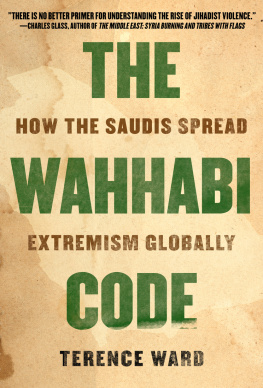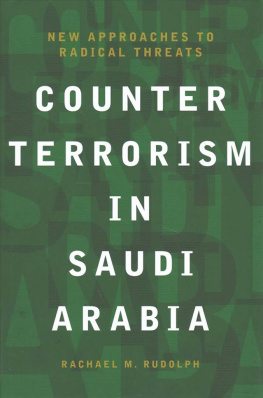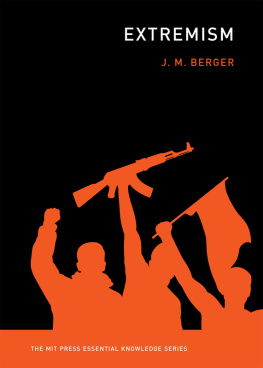Terence Ward - The Wahhabi Code: How the Saudis Spread Extremism Globally
Here you can read online Terence Ward - The Wahhabi Code: How the Saudis Spread Extremism Globally full text of the book (entire story) in english for free. Download pdf and epub, get meaning, cover and reviews about this ebook. year: 2018, publisher: Arcade Publishing, genre: Romance novel. Description of the work, (preface) as well as reviews are available. Best literature library LitArk.com created for fans of good reading and offers a wide selection of genres:
Romance novel
Science fiction
Adventure
Detective
Science
History
Home and family
Prose
Art
Politics
Computer
Non-fiction
Religion
Business
Children
Humor
Choose a favorite category and find really read worthwhile books. Enjoy immersion in the world of imagination, feel the emotions of the characters or learn something new for yourself, make an fascinating discovery.
- Book:The Wahhabi Code: How the Saudis Spread Extremism Globally
- Author:
- Publisher:Arcade Publishing
- Genre:
- Year:2018
- Rating:5 / 5
- Favourites:Add to favourites
- Your mark:
- 100
- 1
- 2
- 3
- 4
- 5
The Wahhabi Code: How the Saudis Spread Extremism Globally: summary, description and annotation
We offer to read an annotation, description, summary or preface (depends on what the author of the book "The Wahhabi Code: How the Saudis Spread Extremism Globally" wrote himself). If you haven't found the necessary information about the book — write in the comments, we will try to find it.
Terence Ward: author's other books
Who wrote The Wahhabi Code: How the Saudis Spread Extremism Globally? Find out the surname, the name of the author of the book and a list of all author's works by series.
The Wahhabi Code: How the Saudis Spread Extremism Globally — read online for free the complete book (whole text) full work
Below is the text of the book, divided by pages. System saving the place of the last page read, allows you to conveniently read the book "The Wahhabi Code: How the Saudis Spread Extremism Globally" online for free, without having to search again every time where you left off. Put a bookmark, and you can go to the page where you finished reading at any time.
Font size:
Interval:
Bookmark:


Copyright 2017 by Terence Ward
All rights reserved. No part of this book may be reproduced in any manner without the express written consent of the publisher, except in the case of brief excerpts in critical reviews or articles. All inquiries should be addressed to Arcade Publishing, 307 West 36th Street, 11th Floor, New York, NY 10018.
First English Edition 2018
Originally published in Italy under the title Per Capire Oggi Il Medio Oriente
Arcade Publishing books may be purchased in bulk at special discounts for sales promotion, corporate gifts, fund-raising, or educational purposes. Special editions can also be created to specifications. For details, contact the Special Sales Department, Arcade Publishing, 307 West 36th Street, 11th Floor, New York, NY 10018 or .
Arcade Publishing is a registered trademark of Skyhorse Publishing, Inc., a Delaware corporation.
Visit our website at www.arcadepub.com.
10 9 8 7 6 5 4 3 2 1
Library of Congress Cataloging-in-Publication Data is available on file.
Library of Congress Control Number: 2018951137
Cover design by Brian Peterson
ISBN: 978-1-62872-971-9
Ebook ISBN: 978-1-62872-972-6
Printed in the United States of America
Not Christian or Jew or Muslim not Hindu,
Buddhist, sufi, or zen. Not any religion
or cultural system. I am not from the East
or the West, not out of the ocean or up
from the ground, not natural or ethereal,
not composed of elements at all.
I do not exist, am not an entity in this world or
the next, did not descend from Adam and Eve or any
origin story. My place is placeless, a trace
of the traceless. Neither body or soul.
I belong to the beloved, have seen the two worlds
as one, and that one call to and know,
first, last, outer, inner, only that
breath breathing human being.
Jalaladdin Rumi
The nationality of Jalaladdin Rumithe poet and the spiritual guide known over centuries as Maulanais still debated today. The Afghans consider him one of theirs, as he was a native of Herat in 1207, while many Iranians insist that he is the highest poet of the Sufi tradition in their Persian language. The Turks know that it was from Konya that his profoundly ecumenical and universal thinking was diffused into the world before his death in 1273.
In America, seven hundred years later, the poetry of Rumi is a bestseller.
CONTENTS

PROLOGUE
Where am I? That is the first question.
S AMUEL B ECKETT , THE UNNAMABLE
This book was written to shed light on what the media has widely chosen to ignore since September 11, 2001. In my storytelling, I have cited the very few writers and journalists who have spoken truth to power. Like Cassandra, their lonely warnings have been cries in the desert.
It began three years ago in Florence when my young niece Fioretta asked me to explain the chaos in the Middle East. Bloodshed had stained the heart of Paris. The brutal ISIS massacre left her stunned and fearful. Could it happen here in Florence? She desperately wanted answers. And so I started speaking, simply and clearly.
From our dialogue, this book was born. Published first in Italy, the Italian edition is now in its fifth reprint and has entered into the curriculum of high schools in various cities from north to south, from Udine to Naples.
The premise of the book is simple: A much-needed debate has been silenced while the vastly diverse followers of mainstream Islam have been targeted and unjustly blamed for extremism. It is my deeply held conviction that when Europeans and Americans learn to pronounce the word Wahhabi , one and a half billion Muslims will be exonerated and freed from the cloud of guilt cast by a new breed of populist politicians who profit by spreading slander and fear.
The truth is that this severe, ultra-conservative Wahhabi sect of Islam has served as both Saudi Arabias official religion and the core ideology for international terror groups such as ISIS, al-Qaedea, the Taliban, and Boko Haram. Over decades, the Saudi regime has engaged in a well-crafted mission to fund charities, mosques, and schools to promote their Wahhabi doctrine across the Middle East and beyond. For years, global leaders at the highest levels of power have avoided speaking publicly about the roots of this extremism. American administrations have even been complicit in its growth. And, this silence has borne bitter fruit.
Meanwhile, in Saudi Arabia, the young crown prince, Mohammad bin Salman, has ascended to great heights. In June 2017one month after the first publication of the bookKing Salman dismissed his own cousin, Crown Prince Nayef bin Abdulaziz Al Saud, and appointed his own son as next in line for the throne. This year, the new crown prince (known as MBS) completed his masterfully orchestrated tour of America that took him from the White House to Silicon Valley, from Hollywood to Harvard, from 60 Minutes to Oprah .
Leading American public relations firms (The Podesta Group, Burson-Marsteller, Hill+Knowlton, King & Spalding, Brownstein Hyatt Farber Schreck, FleishmanHillard, Hogan & Hartson, APCO, Qorvis, The Harbor Group) and a virtual army of 146 lobbyists (comprised of ex-senators, congressmen, ambassadors, and advisors) made sure that the prince enjoyed privileged red-carpet access to Americas leaders in Wall Street, San Franciscos high-tech world, Houstons petroleum sector, as well as New Yorks Jewish community, Los Angeless entertainment industry, and Capitol Hills fawning politicos.
Articles and interviews carefully promoted an air-brushed image of Saudi Arabia as a country in the midst of change. The prince was presented as a visionary. He deftly blamed the West, the Soviet Union and Iran, for the thirty years of draconian social controls that the older generation of his own royal Saud family imposed in response to fears provoked by the siege of Mecca and the Iranian Revolution in 1979.
According to the Financial Times, the kingdoms information ministry is now setting up PR hubs in Europe and Asia to promote the changing face of the Kingdom of Saudi Arabia to the rest of the world and to improve international perception of the kingdom. The move comes as the capital city of Riyadh leads an extraordinary regional embargo of Qatar and a devastating war in Yemen, where it has been accused of bombing civilian targets.
Only time will tell how this re-branding of Saudi Arabia will unfold. Can the worlds most conservative society truly make groundbreaking changes? Or are we witnessing yet another round in what has been a long pattern of Saudi promises and deception?
One may ask whether lifting the ban on women driving or opening three hundred cinemas by 2030 signal a dramatic break with the old regime. Should one also listen to female activists who are voicing their anger about MBSs failure to revoke the guardianship law that places every woman in Saudi Arabia under the control of a male guardian in the family? Or the imprisoned human rights activists monitored by Amnesty International? Or those suffering from the ongoing bombing and starvation in neighboring Yemen?
One word of caution: as Americas political, industrial, and media elite now rush to pardon the Saudi government for past actions, let me cite a brave Muslim journalist whose voice reveals a different perspective. In his Washington Post opinion piece, How Trump Got Played by the Saudis, Fareed Zakaria wrote:
Font size:
Interval:
Bookmark:
Similar books «The Wahhabi Code: How the Saudis Spread Extremism Globally»
Look at similar books to The Wahhabi Code: How the Saudis Spread Extremism Globally. We have selected literature similar in name and meaning in the hope of providing readers with more options to find new, interesting, not yet read works.
Discussion, reviews of the book The Wahhabi Code: How the Saudis Spread Extremism Globally and just readers' own opinions. Leave your comments, write what you think about the work, its meaning or the main characters. Specify what exactly you liked and what you didn't like, and why you think so.











